

Will There Be a Central Asian Spring?- By Joanna Lillis. Imagine the strongman leader of a strategic, Western-friendly, Muslim-majority nation blatantly rigging an election to exclude dissident voices from his puppet parliament.

Ring any bells? A year after two Arab presidents, Tunisia's Zine El Abidine Ben Ali and Egypt's Hosni Mubarak, were chased from office, launching the Arab Spring, it should sound familiar. Toward a Peaceful Pacific - Malcolm Fraser. Exit from comment view mode.
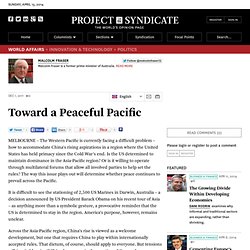
Click to hide this space MELBOURNE – The Western Pacific is currently facing a difficult problem – how to accommodate China’s rising aspirations in a region where the United States has held primacy since the Cold War’s end. Asia’s New Tripartite Entente - Brahma Chellaney. Exit from comment view mode.
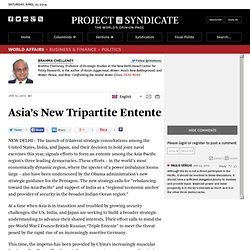
Click to hide this space NEW DELHI – The launch of trilateral strategic consultations among the United States, India, and Japan, and their decision to hold joint naval exercises this year, signals efforts to form an entente among the Asia-Pacific region’s three leading democracies. Fish Story - By Stephanie Kleine-Ahlbrandt. BEIJING – Bad weather was good news in Scarborough Shoal, a contested chain of rocks and reefs in the South China Sea.

Earlier this month, Typhoon Butchoy forced a break in the two-month standoff between Philippine and Chinese vessels as diplomatic efforts faltered. For all it seemed the showdown was about naval power, oil resources, and China's inexorable rise, the Scarborough incident was really about one thing: the fish. Consider it a lesson in how a common fishing run-in can turn into a crisis that can bring an entire region to its knees. Despite the overwhelming preoccupation with the potentially abundant energy reserves in the South China Sea, fishing has emerged as a larger potential driver of conflict. Countries such as the Philippines and Vietnam rely on the sea as an economic lifeline.
"Power to Asia’s Women" by Vishakha N. Desai , Astrid S. Tuminez and Gerald Rolfe. Exit from comment view mode.
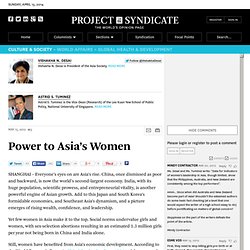
Click to hide this space SHANGHAI – Everyone’s eyes on are Asia’s rise. China, once dismissed as poor and backward, is now the world’s second-largest economy. India, with its huge population, scientific prowess, and entrepreneurial vitality, is another powerful engine of Asian growth. "South Asia’s False Spring" by Brahma Chellaney. Exit from comment view mode.
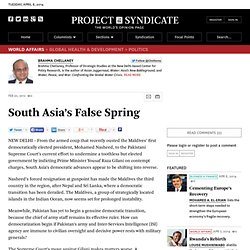
Click to hide this space. "Return to the Arc of Crisis" by Jaswant Singh. Exit from comment view mode.
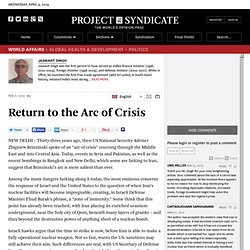
Click to hide this space NEW DELHI – Thirty-three years ago, then-US National Security Adviser Zbigniew Brzezinski spoke of an “arc of crisis” coursing through the Middle East and into Central Asia. Today, events in Syria and Pakistan, as well as the recent bombings in Bangkok and New Delhi, which some are linking to Iran, suggest that Brzezinski’s arc is more salient than ever. Among the many dangers lurking along it today, the most ominous concerns the response of Israel and the United States to the question of when Iran’s nuclear facilities will become impregnable, creating, in Israeli Defense Minister Ehud Barak’s phrase, a “zone of immunity.” Some think that this point has already been reached, with Iran placing its enriched uranium underground, near the holy city of Qom, beneath many layers of granite – and thus beyond the destructive power of anything short of a nuclear bomb.
Waiting for Spring - By Scott Radnitz. On the surface, Central Asia would appear to be ripe for a popular uprising modeled on the Arab Spring. The "stans" are home to repressive governments, high unemployment, inequality, and widespread corruption. Over a year has passed since the wave of protests began to spread across the Arab world. Yet there's been no comparable sign of popular discontent in this other Muslim-majority region. On the contrary, Central Asia's regimes appear to be thriving. In January, Kazakhstan's ruling Nur Otan party won over 80 percent of the votes in parliamentary elections, and on February 12 Turkmenistan's incumbent President Gurbanguly Berdymukhammedov won a national poll with a resounding 97 percent.
Present at the Asian Creation - Jaswant Singh. Exit from comment view mode.
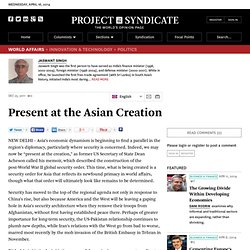
Click to hide this space NEW DELHI – Asia’s economic dynamism is beginning to find a parallel in the region’s diplomacy, particularly where security is concerned. Indeed, we may now be “present at the creation,” as former US Secretary of State Dean Acheson called his memoir, which described the construction of the post-World War II global security order. This time, what is being created is a security order for Asia that reflects its newfound primacy in world affairs, though what that order will ultimately look like remains to be determined. Asia’s Energy, Asia’s Security - Sanjaya Baru. Exit from comment view mode.
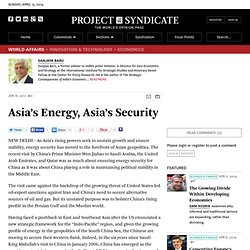
Click to hide this space NEW DELHI – As Asia’s rising powers seek to sustain growth and ensure stability, energy security has moved to the forefront of Asian geopolitics. The recent visit by China’s Prime Minister Wen Jiabao to Saudi Arabia, the United Arab Emirates, and Qatar was as much about ensuring energy security for China as it was about China playing a role in maintaining political stability in the Middle East. The visit came against the backdrop of the growing threat of United States-led oil-export sanctions against Iran and China’s need to secure alternative sources of oil and gas.
U.S.-Europe-Asia: The new strategic triangle. Trilateral dialogues come in many forms.

Those that mix allies with competitors can have the deleterious consequences of diminishing like-mindedness for the sake of inclusivity. More successful trialogues combine like-minded countries that can bring capabilities to bear in ways that cut across national and regional divides, creating an effect that is greater than the sum of its parts.
Taiwan. China. Ukraine. Belarus. Afghanistan. Russia. Japan. Cambodia: beyond the Killing Fields. News Desk: Why Is Nepal Cracking Down on Tibetan Refugees? Friction between Chinese authorities and the five million Tibetans who live within the borders of China is on the rise, and nowhere is the strife more apparent than in the neighboring nation of Nepal. Last month in Kathmandu, I spoke with five young Tibetans who had just journeyed across the Himalayas to escape draconian policies imposed by the Beijing government in their homeland. More than six hundred Tibetans have fled to Nepal this year, even though it’s a dangerous undertaking.
Asylum seekers have lost limbs to frostbite, perished in blizzards, and been arrested by Chinese border patrols. Mustang: Nepal's former Kingdom of Lo. Overturning Lee Kuan Yew's Legacy in Singapore. Lee Kuan Yew, Singapore's storied first prime minister, gave his countrymen two things that elude most developing nations: stability and prosperity. New Humanist (Rationalist Association) - discussing humanism, rationalism, atheism and free thought. The Guardian has a disturbing report on the plight of Alexander Aan, an Indonesian civil servant who is currently in custody and facing an 11-year prison sentence for expressing his atheism on Facebook. In Indonesia, the law guarantees citizens freedom of religion, but only as long as they adhere to Islam, Catholicism, Protestantism, Buddhism, Confucianism or Hinduism. By expressing his atheism Aan - who posted the phrase "God doesn't exist" on a Facebook page – is held to have breached Indonesia's official state philosophy (known as the Pancasila), which requires citizens to have "Belief in the one and only God".
Banana Pancake Eaters in Vang Vieng, Laos » Old World Wandering. Vang Vieng, Laos: the world's most unlikely party town.
North Korea. Star-Spangled Canberra. Magazine - The Vietnam Solution. How a former enemy became a crucial U.S. ally in balancing China’s rise. Bangkok Blues - By Joshua Kurlantzick. Thailand: Internet Trial a Major Setback for Free Speech. (New York) – The conviction of a prominent website manager on computer crimes charges highlights the Thai government’s growing misuse of laws intended to protect the monarchy. Imposing a prison sentence adds to the climate of fear and self-censorship in Thailand’s media, Human Rights Watch said. On May 30, 2012, the Bangkok Criminal Court found Chiranuch Premchaiporn guilty of computer crimes and sentenced her to one year in prison, which the court then reduced to eight months and suspended.
"Australia’s Carbon-Pricing Payoff" by Frank Jotzo. Exit from comment view mode. Click to hide this space CANBERRA – This month, Australia joins a growing number of countries to introduce a price on carbon emissions, at a level twice as high as Europe’s.
Pakistan. Uzbekistan's policy of secretly sterilising women. 12 April 2012Last updated at 00:19 GMT By Natalia Antelava BBC World Service. Karabakh: 'frozen' conflict nears melting point. In the summer of 2008 western governments professed to be surprised by the outbreak of armed conflict in South Ossetia and the resulting short war ↑ between Russia and Georgia. A Heroic Narrative in Violation of Good Conscience. "Stability on the Steppes" by Erlan Idrissov. Azerbaijan facing the music thanks to Eurovision. Azerbaijan: Authorities Violently Disperse Peaceful Rallies. What Lies Beneath - By William Tobey. The Caspian's New Sea Monsters - An FP Slide Show. Young women in Chechnya - The Big Picture.